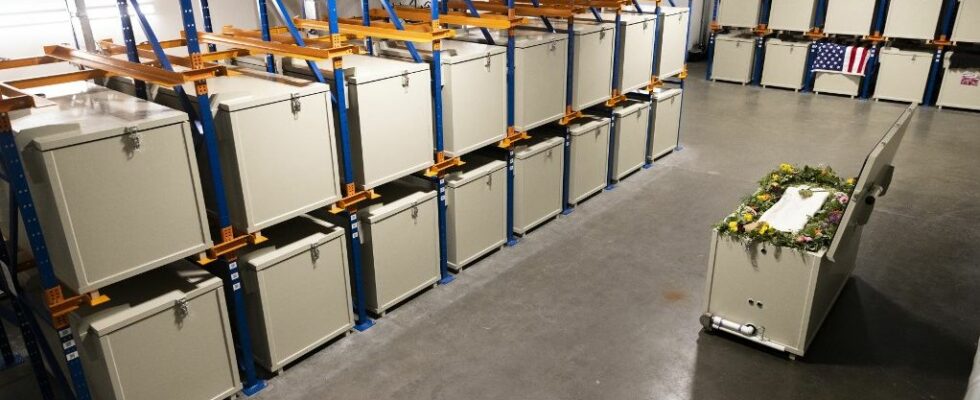Gently transforming the human body into soil… This is the whole promise of Return Homefuneral directors ofAuburn, near Seattle (USA) with his “Terramation” process. A poetic name for compost made from human bodies.
The process is done in three steps. The body of the deceased is first placed in a reusable, semi-open container with suitable bedding made of alfalfa, straws and wood shavings, just to put the microbes in the right conditions to work. A month later and after crushing the bones, we obtain a cubic meter of nutrient-rich soil that Return Home lets rest for another thirty days. Only then is this land returned to the family and can be used as fertilizer.
New York, the sixth American state to take the plunge
Such treatment of a remains is prohibited in France, recalls Michel Kawnik, founder and president of the French Funeral Information Association (Afif). “There are only two possible methods of treatment, either burial [enfouissement sous terre]or cremation [brûler le corps et le réduire en cendres], he explains. And in all cases, coffining is mandatory. In the United States, on the other hand, things are moving. Washington State was the first to legalize human composting in 2019. Colorado and Oregon followed in 2021, then Vermont and California in 2022. At the start of 2023, it is the turn of New York State to take the plunge, reports the Guardian.
Laetitia Royant, co-author, with Brigitte Lapouge-Déjean of Ecological funerals (ed. Living Earth) is convinced that other States will follow… and that France will eventually get started, too. A senator had already raised the question of its legalization in October 2016 and a Modem MP also tabled an amendment to that effect in 2021. “The two initiatives were quickly rejected, but two associations – Humus France and Humus Sapiens– saw the light of day last year and continue to bring this demand”, specifies the expert.
The promise of a real return to the land
Beyond that, Laëtitia Royant like Michel Kawnik note a growing interest of citizens for burial methods that are more respectful of the environment. The proof is: nearly 270,000 people were cremated in France in 2020, which represents 40% of all deaths. A figure that has been constantly increasing since 1975, according to the Afif. ” A study of the funeral services of the city of Paris in October 2017 estimated the carbon impact of a burial 3.6 times greater than cremation”, notes Laëtitia Royant. If this is only an average, the study specifies that the least ecological burial, with the construction of a concrete vault and the installation of a monument, often imported from Southeast Asia, equals five cremations**. “However, it is often these choices that funeral societies push families to make,” laments the expert.
The promise of human composting is radically opposed: to allow a real return to the earth, which is, as a bonus, profitable. It is still necessary to distinguish between the different techniques. Brigitte Lapouge-Déjean issues a few reservations about those used to date in the United States. “We are all the same on very technological solutions, where everything is done to accelerate the process of decomposition, she points out. Two months is extremely fast. Is it really natural then? And even ecological? »
The two authors of Ecological funerals prefer to refer to another technique, theorized by Belgian engineer Francis Busigny under the name of humus. No box this time. The body is placed on a bed of vegetation 20 cm thick then buried by 2m² of this same mixture of soil. “And we let the decomposition take place over a much longer period of twelve months”, resumes Brigitte Lapouge-Déjean. Francis Busigny imagines that a small part of this humus helps to grow a tree in memory of the deceased. The rest would be used to regenerate degraded soils in the surrounding area.
In the meantime, biodegradable coffin and in the ground?
Brigitte Lapouge-Déjean thinks more of this second solution for France, “up to going to garden cemeteries whose earth would be nourished by these decomposed bodies”. Still need to change the law. Impossible mission ? The expert despairs of seeing things change one day and points to “the intense lobbying of funeral companies against human composting”, whose “interest is not only to be an ecological funeral mode but also much cheaper” .
Pierre Larribe, legal manager of the Confederation of funeral and marble professionals (CPFM), defends itself against any opposition from the profession. “If it passes, we will adapt,” he explains. Our work is in any case not limited to the treatment of the remains but also to the organization of the funeral, which will always remain necessary whatever the method of treatment of the bodies chosen… “In the meantime, Brigitte Lapouge-Déjean recalls that it It is already possible to opt for coffins in materials which will deteriorate very quickly, such as cardboard or white wood. “And in the ground rather than in a concrete vault,” she insists. Some natural cemeteries, like that of Souché, near Niortalready offer this type of burial… ultimately not so far from human composting.

